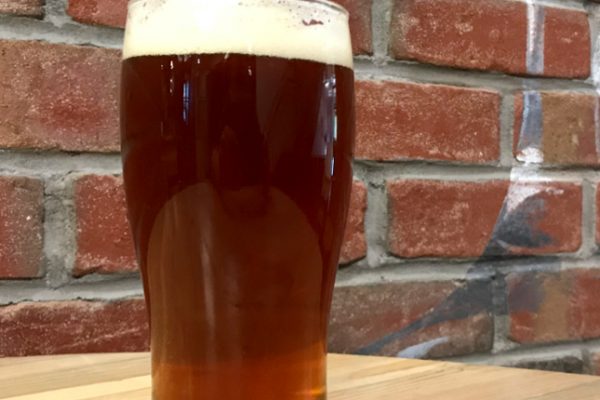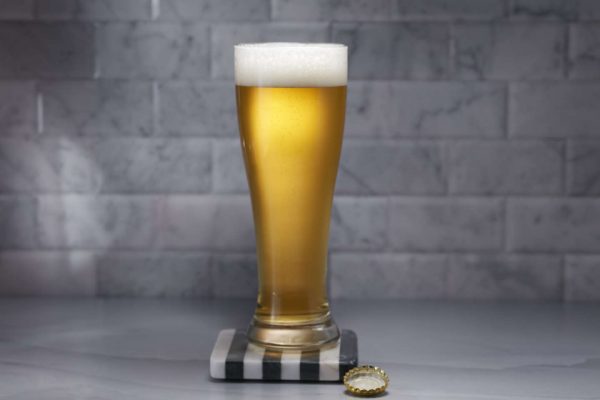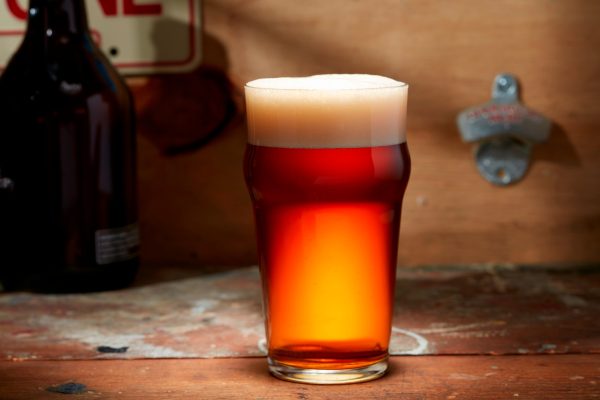
The following beer recipe is featured in the January/February 2016 issue of Zymurgy magazine. Access this issue along with the archives with Zymurgy Online!
From AHA founder and recipe creator Charlie Papazian:
"I recently formulated a new beer called Visionary Mild. Its a mild light brown ale brewed with a relatively new type of crystal malt made by Simpsons called Double Roasted Crystal (DRC) malt, 120°L. It's a crystalized caramel malt of a similar genre as Belgian maltster Castle Malting's Special B and U.S. maltster Briess's Roasted Caramel Malts. All of them add a degree of mildly sweet, dark caramel along with raisin, prune, and dried fruit-like complexity to beer.
"Also significant in the recipe is the traditional English brown malt, which lends an unusual toasted, but not sweet, dryness to beers. If you are formulating beers that tend to head in the direction of sweet and fruity, a bit of brown malt has a good counter-balancing effect on the overall impression of drinkability.
"Traditional English hops are used in order to not overshadow the malt character; in other words, I'm not trying to overpower this beer with American citrus and fruity hop character. I personally have access to home cultivated transplanted wild hops, which with late hopping lend a mild protein-like deliciousness to beer (umami). American Crystal hops or UK East Kent Goldings are also good options for dry hopping. Avoid some of the traditional English ale yeast strains that tend to create diacetyl; it will collide with the malt complexity in this beer. American Ale yeast is a cleaner and better option."
The following beer recipe is featured in the January/February 2016 issue of Zymurgy magazine. Access this issue along with the archives with Zymurgy Online!
From AHA founder and recipe creator Charlie Papazian:
"I recently formulated a new beer called Visionary Mild. Its a mild light brown ale brewed with a relatively new type of crystal malt made by Simpsons called Double Roasted Crystal (DRC) malt, 120°L. It's a crystalized caramel malt of a similar genre as Belgian maltster Castle Malting's Special B and U.S. maltster Briess's Roasted Caramel Malts. All of them add a degree of mildly sweet, dark caramel along with raisin, prune, and dried fruit-like complexity to beer.
"Also significant in the recipe is the traditional English brown malt, which lends an unusual toasted, but not sweet, dryness to beers. If you are formulating beers that tend to head in the direction of sweet and fruity, a bit of brown malt has a good counter-balancing effect on the overall impression of drinkability.
"Traditional English hops are used in order to not overshadow the malt character; in other words, I'm not trying to overpower this beer with American citrus and fruity hop character. I personally have access to home cultivated transplanted wild hops, which with late hopping lend a mild protein-like deliciousness to beer (umami). American Crystal hops or UK East Kent Goldings are also good options for dry hopping. Avoid some of the traditional English ale yeast strains that tend to create diacetyl; it will collide with the malt complexity in this beer. American Ale yeast is a cleaner and better option."
Ingredients:
- 6.5 lb. (3 kg) Maris Otter English 2-row malt
- 12 oz. (340 g) Simpson's Double Roasted Crystal 120°L
- 12 oz. (340 g) English brown malt
- 0.25 oz. (7 g) UK Northdown hop pellets, 6.2% a.a. @ 60 min
- 1 oz. (28 g) UK Kent Golding hops, 6% a.a. @ 60 min
- 1 oz. (28 g) UK Kent Golding hops, 6% a.a. @ 5 min
- 1.25 oz. (35 g) wild hops @ whirlpool
- 0.75 oz. (21 g) Crystal hop pellets, 5.5% a.a. @ dry hop
- 0.25 tsp. (1 g) powdered Irish moss
- American ale yeast (Charlie uses White Labs WLP862 Cry Havoc yeast)
Specifications:
Yield: 5.5 US gallons (21 L)
Original Gravity: 1.040 (10 B)
Final Gravity: 1.009 (2.3 B)
ABV: 4%
IBU: 35
SRM: 16
Efficiency: 75%
Directions:
A step infusion mash is employed to mash the grains. Add 8 quarts (7.6 L) of 140° F (60° C) water to the crushed grain, stir, stabilize, and hold the temperature at 132° F (56° C) for 30 minutes. Add 4 quarts (3.8 L) of boiling water, add heat to bring temperature up to 155° F (68° C), and hold for about 30 minutes. Raise temperature to 167° F (75° C), lauter, and sparge with 3.5 gallons (13.25 L) of 170° F (77° C) water. Collect about 5.5 gallons (21 L) of runoff. Add 60-minutes hops and bring to a full and vigorous boil. The total boil time will be 60 minutes. When 10 minutes remain, add the Irish moss. When 5 minutes remain, add the 5-minute hops. After the boil is finished, add the whirlpool hops and allow to steep. After a total wort boil of 60 minutes, turn off the heat and place the pot (with cover on) in a running cold-water bath for 30 minutes. Continue to chill in the immersion or use other methods to chill your wort. Strain and sparge the wort into a sanitized fermenter. Bring the total volume to 5 gallons (19 L) with additional cold water if necessary. Aerate the wort very well. Pitch the yeast when temperature of wort is about 70° F (21°C). Ferment at about 70° F (21° C) for about one week or when fermentation shows signs of calm and stopping. Rack from your primary to a secondary and add the hop pellets for dry hopping. If you have the capability, “cellar” the beer at about 55° F (12.5° C) for about one week. Prime with sugar and bottle or keg when complete.
Extract Option
Substitute the Maris Otter malt with 5 lb. (2.3 kg) of light malt extract syrup or 4.3 lb. (1.95 kg) dry light malt extract. Also consider reducing the whirlpool hop addition to from 1.25 oz. to 1 oz. (28 g). Place crushed grains in 2 gallons (7.6 L) of 155° F (68° C) water and let steep for 30 minutes. Strain out, rinse with 3 quarts (3 L) of hot water, and discard the crushed grains, reserving the approximately 2.5 gallons (9.5 L) of liquid to which you will now add malt extract and 60 minute hops. Bring to a boil. The total boil time will be 60 minutes. When 10 minutes remain, add the Irish moss. When 5 minutes remain, add the 5-minute hops. After a total wort boil of 60 minutes, turn off the heat and add the steep-after-boiling hops. Immerse the covered pot of wort in a cold water bath and let sit for 15–30 minutes or the time it takes to have a couple of homebrews. Strain out and sparge hops and direct the hot wort into a sanitized fermenter to which 2.5 gallons (9.5 L) of cold water has been added. If necessary, add cold water to achieve a 5.5 gallon (21 L) batch size. Aerate the wort very well. Pitch the yeast when temperature of wort is about 70° F (21°C). Ferment at about 70° F (21° C) for about one week or until fermentation shows signs of calm and stopping. Rack from your primary to a secondary and add the hop pellets for dry hopping. If you have the capability, "cellar" the beer at about 55° F (12.5° C) for about one week. Prime with sugar and bottle or keg when complete.





Share Post